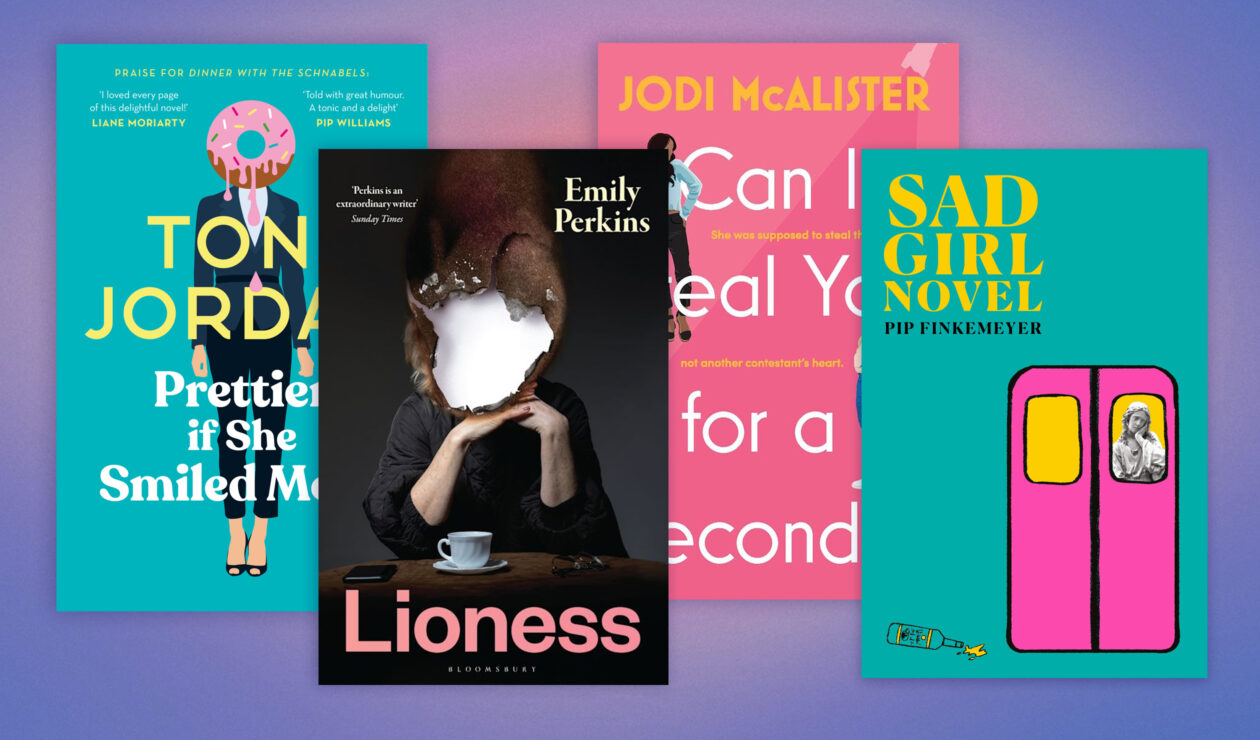I reflected in a recent column that I’m a bit sick of sad-girl novels: stories of gorgeous 20-somethings having bad sex and chaotic lives. Sophie Cunningham’s excellent 2022 novel This Devastating Fever contains a moment that identifies the trend peaking.
Her narrator is a writer, nearly ready to sell the inventive, layered, genre-defying novel she’s been writing for 15 years: about Leonard and Virginia Woolf, colonialism, trauma, environmental devastation, love and family. (The novel we are reading.) Her agent ruefully tells her, “the only books I seem to be able to sell at the moment are books about young women having bad sex”. It’s 2020, and Melbourne is in COVID lockdown.
Judging by bookshop offerings over the past few years, I can see what Cunningham’s narrator was saying. And fictional agents and I are not the only ones to see the trend. Pip Finkemeyer’s Sad Girl Novel (Ultimo), set in Berlin, cleverly comments on it – by both being an example of the titular genre and satirising it.
“I had created my own little world in which I was important,” thinks hot-mess narrator Kim, in the first third of the novel, “and I was doing important work: international sad girls everywhere were urgently waiting for me to finish my novel.”
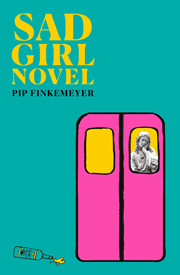 Kim is inspired to leave her painfully generic job, doing something with ATMs, after a fling in New York with Matthew, a bland literary agent with inherited wealth, a rescue dog, and an all-grey wardrobe. Despite having not read a word of her writing, he urges her to quit her job to write the novel she vaguely aspires to, then continues to encourage her via long-distance emails, while evading emotional connection. Kim’s best friend Bel, a single mother she had promised to support (but never seems to), is her emotional rock, often paying careful attention to Kim’s melodrama.
Kim is inspired to leave her painfully generic job, doing something with ATMs, after a fling in New York with Matthew, a bland literary agent with inherited wealth, a rescue dog, and an all-grey wardrobe. Despite having not read a word of her writing, he urges her to quit her job to write the novel she vaguely aspires to, then continues to encourage her via long-distance emails, while evading emotional connection. Kim’s best friend Bel, a single mother she had promised to support (but never seems to), is her emotional rock, often paying careful attention to Kim’s melodrama.
Kim complains about how most men never listen and are never curious about other people’s lives – but it’s a complaint that applies squarely to her. While much of this is conscious, and the point of the novel, I got sick of Kim after a while. And the novel’s deeply embedded perspective became claustrophobic. It’s all clever, but it also feels somewhat empty, particularly as Kim is such a passive narrator.
Sad Girl Novel does something interesting and periodically fun in critiquing its own genre, but the best sad-girl novels do something better, and richer: they critique what it is to struggle with being human, trying and failing to perform “likeable” femininity. In fact, their protagonists often explicitly struggle to feel they are likeable. (A disconnect that frequently leads to the bad sex and toxic relationships.) Which is ironic, given that the backlash against such novels is often along the lines of: Why should we care what happens to these unlikeable women?
There’s not much sex in Toni Jordan’s Prettier if She Smiled More (Hachette). And protagonist Kylie (who is 40-something, not 20-something) isn’t exactly unlikeable… but she’s not exactly easy to like either. She’s like your irritating sister, who you might love, but you also can’t figure out and don’t quite know how to spend time with. (Note: this is not a comment on my own very likeable sisters.) This feeling might be partly because it’s the second book in Jordan’s series about an extended family, the Schnabels.
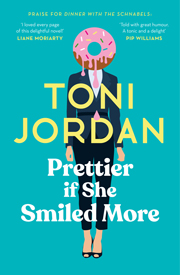 Kylie is fan of safety, routine and control. She wears the same navy suit to work at a friendly but dingy neighbourhood pharmacy every day. She eats sensible, dull meals that involve steamed vegetables. Her dream is to buy the pharmacy and keep everything the same.
Kylie is fan of safety, routine and control. She wears the same navy suit to work at a friendly but dingy neighbourhood pharmacy every day. She eats sensible, dull meals that involve steamed vegetables. Her dream is to buy the pharmacy and keep everything the same.
But in the week we meet Kylie, she arrives at work to find the pharmacy sold to a chain (and she must perform for one of its managers and apply for her own job to keep it), her loud, flashy mother breaks an ankle and needs looking after, and she discovers her boyfriend cheating in a banal but remarkable way. Thrown off track, she’s uncharacteristically chaotic just when she needs not to be. But a glimmer of possibility winks throughout: of another kind of existence, less guaranteed-safe but more fulfilling.
Did I mention this book is funny? Toni Jordan is a skilful comic writer whose seemingly frivolous comedies always have thoughtful ideas at their core, and often layer their rollicking plots with genuine pathos. Here, as we discover why Kylie is so attached to her routines, and how she became who she is, she becomes someone we deeply care about.
Can I Steal You for a Second? (Simon & Schuster) is technically about a 20-something sad girl. We meet Mandie, a bisexual mechanic who isn’t used to wearing dresses, crying over her ex while auditioning for a Bachelor-like reality-TV show. But while the vibe of the sad-girl genre is sardonic humour in a dark bar with a hangover ahead, Jodi McAlister’s is champagne and a D&M with your best mates: it’s infused with knowing humour and visits hard places, but is sparkling and ultimately hopeful.
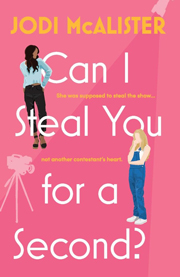 Mandie befriends gorgeous Dylan at auditions, and they navigate the weirdness and machinations of reality romance together. But Dylan is the favourite of the bachelor prize, and Mandie finds herself jealous… of the man she’s supposedly competing for. Like Jordan’s novel, this is also the second book in a companion series (one you can read solo or out of order if you want). Also like Jordan’s novel, you can race along its sparkling surface knowing it’s anchored to authentic emotional truths below: about navigating difficulty, taking risks to grasp the possibility of joy and kindness as a value. And McAlister, an actual academic expert on romance and The Bachelor franchise, and as a fan of both, has created a rare thing: a loving satire that is both deconstruction and tribute.
Mandie befriends gorgeous Dylan at auditions, and they navigate the weirdness and machinations of reality romance together. But Dylan is the favourite of the bachelor prize, and Mandie finds herself jealous… of the man she’s supposedly competing for. Like Jordan’s novel, this is also the second book in a companion series (one you can read solo or out of order if you want). Also like Jordan’s novel, you can race along its sparkling surface knowing it’s anchored to authentic emotional truths below: about navigating difficulty, taking risks to grasp the possibility of joy and kindness as a value. And McAlister, an actual academic expert on romance and The Bachelor franchise, and as a fan of both, has created a rare thing: a loving satire that is both deconstruction and tribute.
Devouring this series somehow reminded me of teenage pleasures; these novels deliver that same hit of character-based narrative pleasure and connection, at a rollicking pace. They’re perfect to curl up with under a blanket, armed with your favourite snacks.
Therese, the polished protagonist of Emily Perkins’ brilliant Lioness (Bloomsbury) has worked at being “likeable” all her adult life: she’s achieved it by being a blank, pleasing slate onto which others can project their desires and expectations. In fact, she’s turned it – and herself, her family – into a brand. She’s the face of Therese Thorne, a homewares chain that sells expensive pretty things and inspirational or “witty” knick-knacks, from candles and soft furnishings to aprons emblazoned with “Live Laugh Love” or “Strong Female Character”.
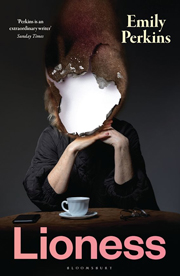 From the opening pages, Perkins takes us under the hood of Therese’s performed likeability, showing us the effort in the performance, including an inherently dishonest passivity that rejects responsibility for anything beyond the trivial. Of course, that exposed disparity between performed effortlessness and actual effort erodes Therese’s likeability. The reader, like many of the people who surround her, is suspicious and on edge, alert for clues that will signal her real self. Those clues emerge in layers, as Therese loosens control, not always on purpose.
From the opening pages, Perkins takes us under the hood of Therese’s performed likeability, showing us the effort in the performance, including an inherently dishonest passivity that rejects responsibility for anything beyond the trivial. Of course, that exposed disparity between performed effortlessness and actual effort erodes Therese’s likeability. The reader, like many of the people who surround her, is suspicious and on edge, alert for clues that will signal her real self. Those clues emerge in layers, as Therese loosens control, not always on purpose.
Similarly, the narrative is studded with clues to the world around her Therese prefers not to see: we glimpse the truth as she glances at its outline and swiftly looks away. A series of ordinary accidents – a broken window, a near-drowning, a spoiled rug, a burned portrait – cumulatively build throughout to create an escalating atmosphere of foreboding. These are all deliberate, beautifully calibrated effects.
Therese married her much-older, adoring, property-developer husband, Trevor, who owns the building her store’s flagship is housed in, in her early 20s. She’s now nearly 50. Her spoiled but scarred stepchildren, not far from her age, resent her, even as she plays the perfect housemaker at family gatherings.
Trevor is embroiled in a corruption scandal at the same time as Therese starts spending time with downstairs neighbour Claire, a “siren” who’s in the process of shedding the feminine performance Therese has perfected. Claire ditches her professional job to work in catering, throws out her make-up and then her furniture, and builds a stage in her apartment for dancing, no inhibitions. Therese, who is starting to feel her “skin split”, is enthralled by the possibilities this presents.
I’ve long been a fan of Emily Perkins’ writing, since her perfectly formed short-story debut Not Her Real Name in 1996. (She was also longlisted for the Women’s Prize in 2013, for her novel The Forrests.) A former actor who expertly inhabits the characters she writes with precise details and gestures, her work has long been interested in self-performance and how we slip in and out of constructed identities.
This ambitious, occasionally deeply weird (in the best way) novel builds on decades of deconstruction to interrogate both human nature and “late capitalist” consumer society. It urges us to question, to risk (or even embrace) discomfort, while recognising how deeply some of our societal structures – and what we expect of other humans – are ingrained.

Get InReview in your inbox – free each Saturday. Local arts and culture – covered.
Thanks for signing up to the InReview newsletter.
While Lioness flirts with self-actualisation as rejecting all responsibility, it refreshingly recognises that most of us can’t afford to. It’s complicated, like we all are. Though perhaps in a way, it’s its own form of genre: 20-something sad girl, meet the skin-splitting menopausal woman.
Jo Case is a monthly columnist for InReview and deputy editor, books & ideas, at The Conversation. She is an occasional bookseller at Imprints on Hindley Street and former associate publisher of Wakefield Press.
Support local arts journalism
Your support will help us continue the important work of InReview in publishing free professional journalism that celebrates, interrogates and amplifies arts and culture in South Australia.
Donate Here
